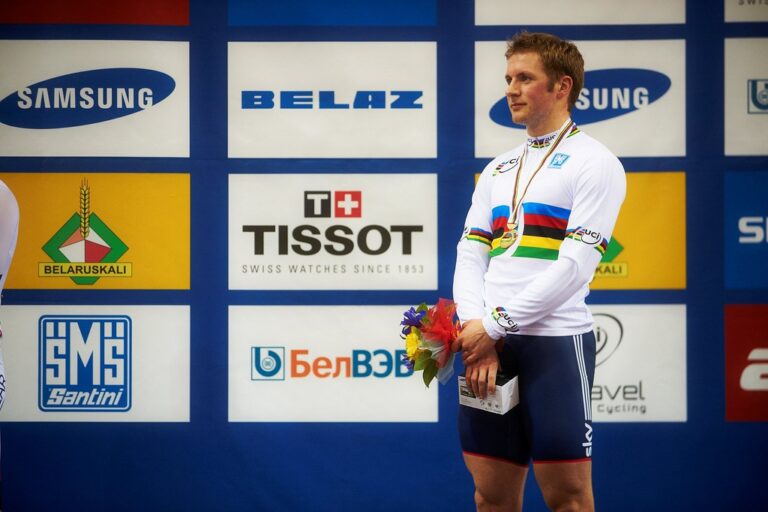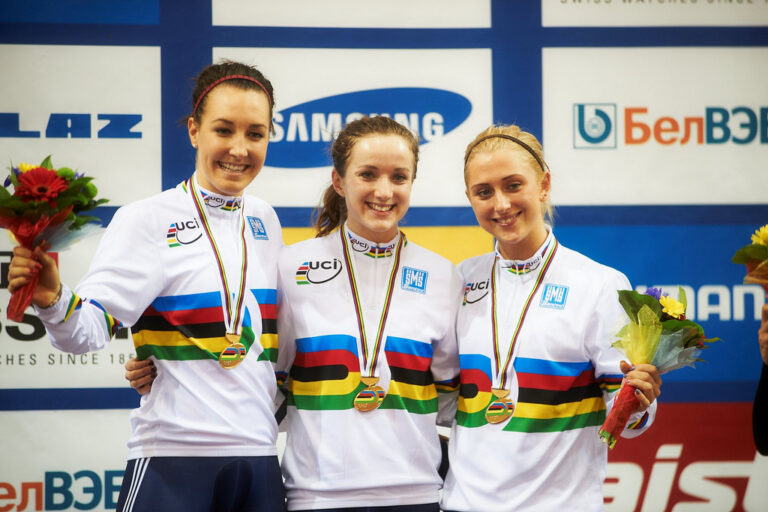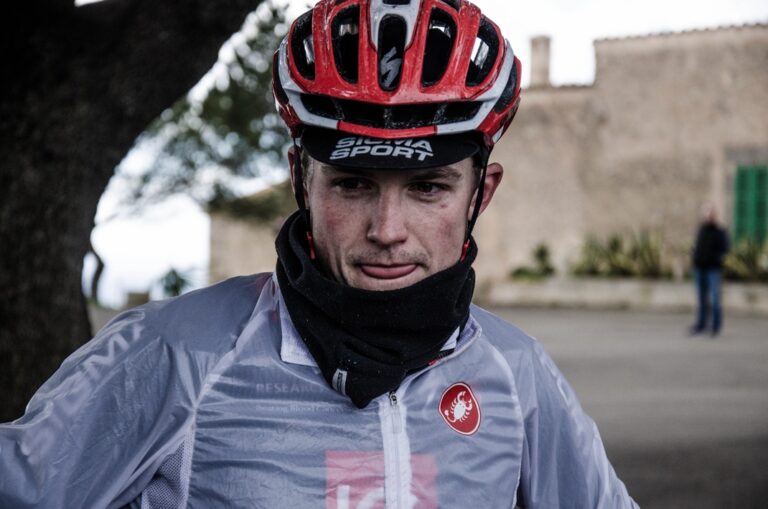Much of the praise lavished on British cycle sport in 2012 followed Team GB cycling’s table-topping performance at the Olympic Games in London.
For the second consecutive Games, the nation’s cyclists not only outstripped their opposition, but also their team-mates from other sports.
Have we witnessed the last of the glory days, or is there a new generation waiting in the wings to take over from established riders like Sir Chris Hoy and Victoria Pendleton?
In short, can we expect a third helping of Olympic cycling success at Rio 2016? And more pertinently for a series titled, ‘Follow That: how 2013 can top 2012’, can Team GB deliver at the world track championships in Minsk, next month?
We’ll consider Great Britain’s chances in some of the events on the world championship programme.
Men’s team sprint
The men’s team sprint will suffer the greatest loss with the absence of Sir Chris Hoy, who has publicly stated on many occasions that he believes his career will end at the Commonwealth Games in 2014. Who then will replace him at man three in Rio, for surely only this position will be up for grabs (British Cycling’s coaches will be in no hurry to replace 20-year-old Philip Hindes or 24-year-old Jason Kenny)?
Ed Clancy raced for the first time at man three in Glasgow and while comfortably beaten by Germany, the trio has four years to improve. Can Clancy? At this stage in the Olympic cycle, the double gold medalist is Team GB’s best bet, and likely to be selected for the world championships, barring the return of Hoy. Clancy will face an increasing challenge in the run up to Rio from young riders like Kian Amadi and Callum Skinner.
Men’s sprint
Triple gold medalist, Jason Kenny, will still only be 28-years-old when events at the Rio Games begin, and entering his prime. The Bolton Terrier will have a wealth of experience to call on at what looks certain to be his third Games. He briefly held the world championship in 2012 when Gregory Bauge was stripped of the title for missing an out of competition drugs test, but lost out to the Frenchman in the semi-final at Melbourne last year (Bauge went on to reclaim his title).
Kenny’s success in London, however, will have changed that rivalry irrevocably. Bauge was reduced to sly comments and insinuations at the post-Olympic final press conference; something the good-natured Kenny, still basking in the glory of his Olympic triumph, recorded at Bauge’s expense, barely seemed to register. He clearly has Bauge rattled. Expect Kenny to retain the upper hand in Minsk.
Men’s keirin
Great Britain’s post-London era in the men’s keirin has got off to a stuttering start and the task of replacing Sir Chris Hoy looks at its most daunting in this event. Braveheart’s astonishing victory in London, a mix of talent and tenacity, balanced heavily in favour of the latter on the last lap of an unforgettable Olympic final, looks hard to replicate.
But we are four years from Rio, and much can change. Kenny clearly has the speed to win Olympic keirin gold, but will need a change in the rules to allow him to attempt the sprint, team sprint, keirin triple achieved by Hoy in Beijing.
Should the one competitor per nation, per event regulation remain in place (one imposed solely to limit Great Britain’s medal prospects), Kenny is unlikely to sacrifice the chance of defending his Olympic sprint title for a shot at the infinitely less controllable environment of the keirin, and British Cycling’s coaches are equally unlikely to sacrifice his berth in the team sprint.
This isn’t to say they aren’t prepared to consider it. Kenny competed in the keirin in Glasgow, but came to grief in the final when attempting to pass Germany’s Stefan Boetticher from the outside. Kenny remains Great Britain’s best bet in the event at the forthcoming world championships, but again, only if Hoy is absent.
Young rider, Kian Amadi, rolled out for the event in Cali, but finished eleventh. His second place in the kilo (not an event at London 2012, but one purists would like to see reinstated in the Olympic programme) proved his speed, and with four years ahead of him, the teenager has plenty of time to develop the race craft required for the keirin, but selection for Minsk could be a case of too much, too young.
Men’s team pursuit
Young riders may not get a look-in at the men’s team pursuit in Rio, which, in recent years, has become track cycling’s blue riband event. The line-ups from Beijing and London, gold medalists all, read like a veritable who’s who of British cycling’s recent greats. And with Bradley Wiggins, a member of the gold medal winning team in Beijing, and Mark Cavendish, whose failure to win an Olympic medal remains the only gap on a glittering palmares, both expressing a desire to join the team pursuit squad in Rio, there will be few events for which places will be harder to attain.
Great Britain sent out a young squad in Glasgow, to disastrous effect. Owain Doull, Sam Harrison, and Joe Kelly, ended their challenge on the boards. Only Andy Tennant, a member of the reigning world championship winning squad, remained upright.
British Cycling’s coaches are unlikely to repeat the experiment at the world championships. The likely opportunity created should Geraint Thomas makes good on his promise to focus on the road this season must go to Tennant, a rider selected for the Olympic Games as part of a five-man line up, but who did not ride, owing to the prowess of Clancy, Thomas, Pete Kennaugh, and Steven Burke. Substituting Thomas for Tennant would still create a formidable quartet, one with the pedigree to start as favourites to defend their title in Minsk.
Men’s omnium
Clancy produced a fine performance in London to claim an Olympic bronze medal, but would be unfancied to tackle the men’s team pursuit, the men’s team sprint, and the omnium. The latter would be the event Clancy would most readily sacrifice. He told RCUK last year that the satisfaction of winning medals by his own efforts did not compare to that gained from winning as part of a team.
Jon Dibben, 19, made a gallant attempt at omnium glory at the second round of the 2012-13 World Cup in Glasgow last November, finishing fifth overall despite being called up to represent his country shortly after enrolling in British Cycling’s vaunted Academy. With four years to hone his assault on the track’s multi-discipline event, one Laura Trott clearly relishes alongside her women’s team pursuit duties, Dibben could carve himself a niche in the public conscious come 2016. Should Clancy find himself occupied with the team sprint and team pursuit in Minsk, Dibben could find himself carrying the nation’s hopes sooner than expected.
Women’s sprint
How do you replace Victoria Pendleton? There can be few more challenging tasks in cycling. Other nations might choose not to try, regarding Pendleton as an irreplaceable, once-in-a-lifetime talent. This is not the way at British Cycling, however, and few would bet against Ian Dyer and Jan Van Eiden moulding a future champion from even the basest clay. In Becky James and Jess Varnish, however, they already have two world class talents to hone. There is nothing to choose between them, as those who witnessed their duel in Glasgow will attest.
The world championships, however, will bring them up against Olympic champion, Anna Meares (Australia) and Shuang Guo, one half of the Chinese duo who won women’s team sprint gold in London. Meares’ team sprint partner, Kaarle McCulloch, is also vastly experienced. All three would start as favourites to beat James or Varnish, but with James’ confidence boosted by a fine showing in Glasgow, a medal remains a realistic prospect.
Women’s team sprint
James and Varnish already look like British Cycling’s women’s team sprint line-up for years to come. Varnish was the only member of Great Britain’s track cycling team not to win a medal at London 2012, having been disqualified with Pendleton from the women’s team sprint after setting a world record in the previous round. Varnish’s response in Glasgow was enough to show she has moved on from the disappointment.
James and Varnish won in Glasgow, recording a time of 33.428, some nine-tenths of a second slower than the world record set with Pendleton at London 2012 (one lowered to 32.447 in the final by China). A slower track at Glasgow would have had an effect, along with the relative inexperience of the partnership. But the mix is right, and securing Pendleton’s legacy in the team sprint (Queen Vicky won three world team sprint titles, two with Shanaze Reade and one with Varnish) looks like the least of British Cycling’s problems. Dyer and Van Eiden know how to beat the Australian duo of Meares and McCulloch and the Chinese pairing of Gong and Guo, having done so previously. Minsk may be too soon, but the partnership of James and Varnish has future world and Olympic champions written all over it.
Women’s keirin
The shadow of Pendleton is cast across the women’s keirin, too. The event was her last hurrah at London 2012, one in which she won gold against the odds. Both James and Varnish contested the event in the immediate aftermath of the Games, at the first round of the 2012-13 World Cup in Columbia. James recorded a narrow victory over her team-mate, finishing fourth to Varnish’s fifth. The Welsh rider was the sole Team GB entrant in Glasgow, where she finished fifth. James looks more suited to the event than Varnish, whose power and ferocity from a standing start gives her an edge in the one lap time trial.
The harum-scarum nature of a mass start race leaves far more to chance and form on the day than the two-wheeled chess match that is the sprint. Neither James or Varnish can be discounted as medal prospects in Minsk.
Women’s team pursuit
If breaking into Team GB’s men’s team pursuit squad looks like a daunting task, spare a thought for the riders aiming to displace Dani King, Laura Trott, or Jo Rowsell. The trio was arguably the best of any team in London, simply getting faster every time they raced, setting new world records and then smashing them as if for fun. All three are under 25; Rowsell is the eldest at 24, with Trott just 20. They could dominate the event for the next three Games. The trio will start as massive favourites to defend their world title in Minsk.
World junior time trial champion, Eleanor Barker, younger still at 16, could be the fourth spoke in the wheel should the women’s team pursuit gain parity in distance and personnel with the men’s event. The Welsh girl raced to victory with Trott and King at Glasgow, albeit in a much slower time than the two Olympic champions had recorded with Rowsell in London.
Women’s omnium
Olympic women’s omnium champion, Laura Trott, is, it bears repetition, just 20 years old. Her victory at the Olympic Games was emphatic, and her follow-up victory three months later in Glasgow, at the end of a long season when others with her achievements would have raced for fun, spoke volumes for her competitive spirit. Trott will start as a huge favourite in Minsk to defend her world title.
Table toppers?
If 2013 can top 2012 as we contend, then Great Britain must top the medal table in Minsk. Team GB failed to do so in Melbourne last April, losing out to the home nation by just two silver medals.
A table-topping performance is a huge ask from a team likely to be in some state of transition and blooding new riders at the highest level. But British Cycling’s track teams, steered by Dave Brailsford and Shane Sutton, operate to a higher standard than others.
With the Giro d’Italia and Bradley Wiggins’ first big goal of the season not until May, February’s world track championships will do much to determine if 2013 becomes another landmark year for British cycle sport.




